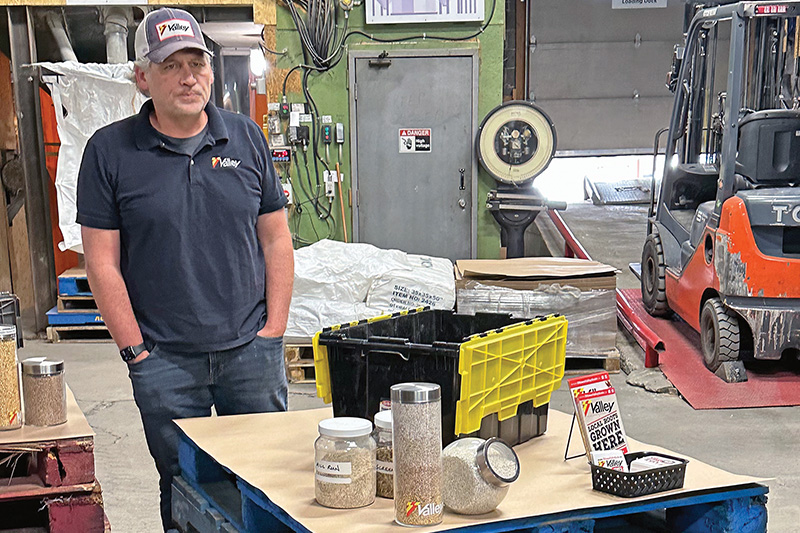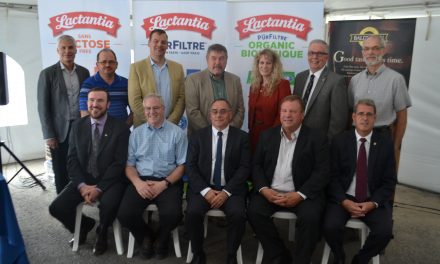Kevin Stewart explains the difference between the products at various stages of the milling process. Vogel Photo
CARP – Kevin Stewart, co-owner of Ottawa Valley Grains hosted the Ottawa Valley Seed Growers Associaton on Tues., Aug 20 at the Carp facility. The presentation began with an explanation of the mural on the outside of the building. This depicts the history of the family members who have started and developed the business.
“We are doing a lot in a very small footprint. This is our whole operation right here, we can fit about five truckloads of finished product” stated Stewart. With the ability to process about 5 truckloads of product a week they are making it as quick as they can ship it.
With the main product being used is barley and soft white winter wheat, they have been able to compete in the niche market.
Stewart explained that the barley and wheat are purchased from local producers.
The barley is delivered, it is cleaned and then dehulled. This process removes the outside hull. Depending on what product is being produced, there is further processing. “We may grind it a little bit more to take off the bran layer and then even some of the endosperm to make pearl barley, which is our most fine product. Pot barley is a little less refined.” Explained Stewart.
Have you ever wondered the difference in the products. The difference is that pearl barley is more refined, being a whiter, lighter color. It cooks faster and is the most popular product. Pot barley is less refined but is actually a more nutritious product.
The process was described as stones create friction or abrasion which will peel off the hull and then the brand layer off of the grain. After this process has been done the mill is left will a product they call mill run. With the suction fans throughout the process this product is blown into a storage area and is typically sold to dairy farmers as feed. The byproduct is very high in fiber and protein relative to it’s weight and cost.
The tour of the facility gave the attendees an explanation of how stones are used to process the grain with screens in the machines sorting the various products as the grain moves along the processing line.
With being able to process from start to finish there is no additives in the products they produce so the one disadvantage is that flour has a recommended shelf life of six months whereas other processed flours have additives that allow the product to be stored for years.
The soft white wheat is turned into pastry flour because it is low in protein and gluten whereas hard spring wheat is high in protein and gluten.
Most of the products produced in this facility are packaged into 1000 kg totes and is sold exclusively to packaging facilities. There are approximately 12 different white label products (ie. Blue Menu, President’s Choice or Bulk Barn) that are Valley products. They also produce 25 kg bags that are sold to bakeries in the area. The next option is 10 kg bags that are sold to Costco.
They have also shipped product to Central America, South America. He is proud to say that two years ago they shipped 810 containers to Isreal.
During Covid, when the stores were low on flour they had people calling wanting to know if they would be able to sell flour locally. Once they figured out the packaging and handling, they expanded their offerings to include smaller packages that can be bought right in the store at their Carp location.
Stewart encouraged that he is always looking for new producers of quality barley and soft white winter wheat. He prefers to buy all products local and has many farmers that have been working with them for many years.













